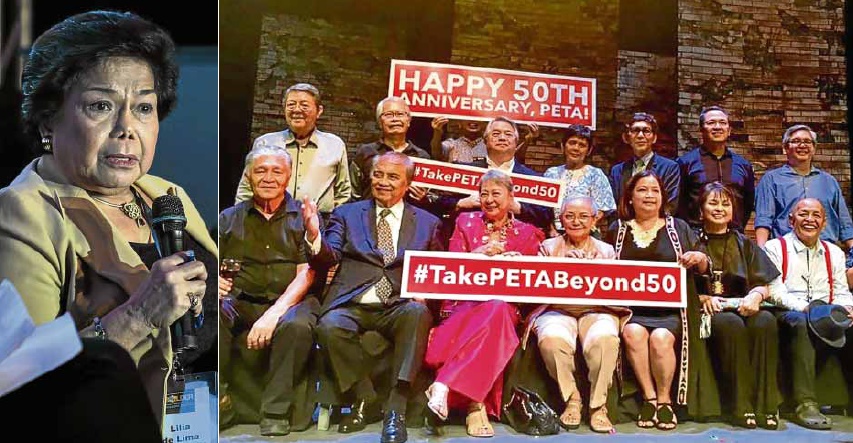Peta, former Peza chief win RM Awards

FILIPINO AWARDEES Lilia De Lima (left photo),who headed the Philippine Economic Zone Authority (Peza) for 21 years, and the
Philippine Educational Theater Association (Peta) are among the six recipients of this year’s Ramon Magsaysay Awards, regarded
as Asia’s Nobel Prize. The Peta board of trustees (right photo) led by founder Cecile Guidote-Alvarez (third from left) celebrates
the theater group’s 50th anniversary. PHOTO FROM PETA’S FB PAGE
Lawyer Lilia De Lima, who once headed the Philippine Economic Zone Authority (Peza), and the Philippine Educational Theater Association (Peta) are among this year’s recipients of the Ramon Magsaysay Awards.
De Lima and Peta join four other awardees from across Asia:
Yoshiaki Ishizawa, Japan, for his efforts to restore Cambodia’s cultural monuments such as Angkor Wat.
Abdon Nababan, Indonesia, for his advocacy on behalf of the Adat or indigenous communities of his country.
Gethsie Shanmugam, Sri Lanka, who has worked on rebuilding war-scarred lives, especially women and children.
Tony Tay, Singapore, for a volunteer movement he founded to address hidden hunger.
De Lima, born in Iriga City, Camarines Sur, was cited for turning the overstaffed, inefficient Peza into one that
has won widespread respect while boosting exports and attracting investments, the Ramon Magsaysay Award Foundation (RMAF) said on Thursday.
De Lima was credited for her key role in the country’s shift in the 1990s to a liberalized, export-led, competitive growth economic policy.
“During her [21-year] term, Peza’s accomplishments have been nothing short of spectacular,” the RMAF said.
Impressive example
The number of Peza ecozones increased from the initial 16 that De Lima inherited to 343 by 2016, and the number of
registered enterprises rose from 331 to 3,756. Investments reached P3 trillion and ecozone exports totaled $629 billion.
“In a world where there is rampant cynicism and real pain about how governments function, examples of public servants like De Lima and her Peza team are especially impressive.
“And yet, reflecting on her career, she says: ‘I cannot solve the problems of the world but if in my own little area I can make a difference, then I must make that difference.’ For all workers in government, it is a credo to follow,” the RMAF said.
Peta’s rare distinction
Widely considered as the equivalent of the Nobel Prize in Asia, the Magsaysay Awards are typically given to paragons in government service, public service and community leadership.
But in a rare distinction for an organization in the arts and culture sector, Peta—which is also celebrating its 50th anniversary this year—was lauded for “its bold, collective contributions in shaping the theater arts as a force for social change, its impassioned, unwavering work in empowering communities in the Philippines, and the shining example it has set as one of the leading organizations of its kind in Asia.”
Founded in 1967 by Cecile Guidote-Alvarez based on her vision of a national theater movement that would apply the tools of dramatic arts to nation-building and social consciousness, Peta became a professional theater company unlike any other.
Its members would be artist-teachers who, aside from performing onstage, interacted with urban and rural communities throughout the Philippines through immersion, research activities and workshops.
The results and insights of such community organizing with students, workers, farmers, evacuees in conflict areas and other marginalized groups were invariably reflected in the plays that Peta mounted.
Social issues
By creating its own writers’ pool, Peta also vastly expanded the Filipino canon with important original plays that carried the “Peta trademark”—“the ‘committed’ play, devoted to an examination and interpretation of social issues…,” according to the Cultural Center of the Philippines (CCP) Encyclopedia of Art.
The Magsaysay awardees will receive a medallion, a cash prize and a certificate. The formal awarding ceremonies will be on Aug. 31, 4 p.m., at the CCP in Pasay City. —WITH A REPORT FROM AFP